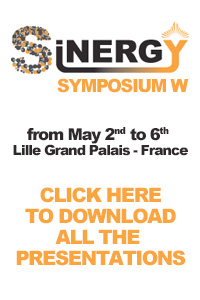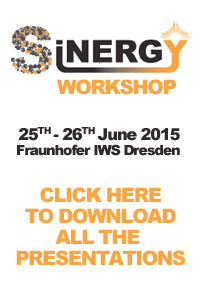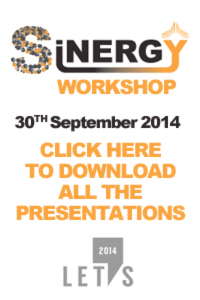
First Sinergy Workshop
30th September 2014
LET’S 2014 conference premise, Palazzo della Cultura e dei Congressi
Piazza Costituzione 4/A Bologna, Italy
“Micro and nanotechnologies have already made possible the fabrication of small, low cost and good performance sensors that are called to be protagonists of continuous monitoring scenarios and distributed intelligence paradigms. Energy autonomy keeps being one of the most desired enabling functionalities in the context of off-grid applications, such as wireless sensor networks (Internet of Things, Trillion Sensors).
Low energy consumption, energy harvesting (tapping into environmentally available sources such as heat and vibrations), and coupling those harvester devices to secondary batteries to buffer enough energy to account for the power demand peaks required by the communication unit of wireless nodes, may be a good solution in different application scenarios.
In a nutshell, SiNERGY (Silicon friendly materials and device solutions for microenergy applications) deals with micro and nanotechnology approaches and 3D architectures for energy harvesting (thermoelectrics / mechanical energy harvesting) and solid state microbatteries. In the workshop the main research lines of the project will be presented together with keynote speeches aligned to the project goals”
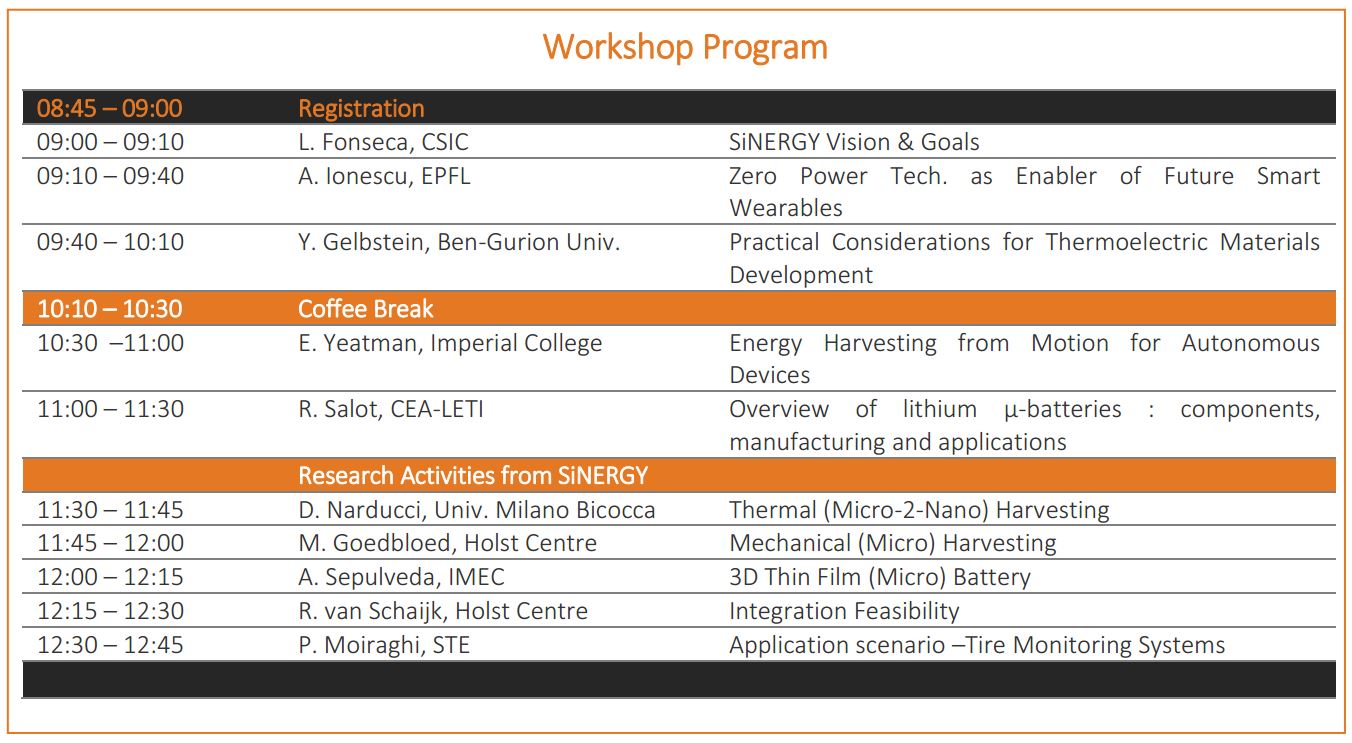
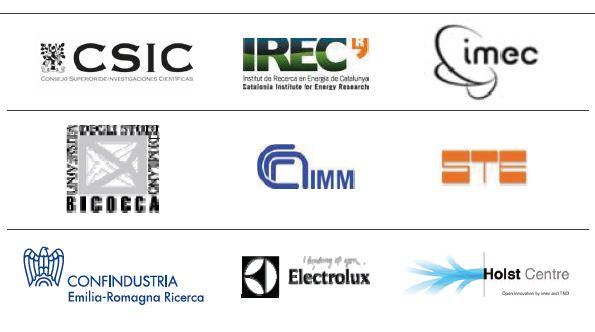
Fill out the form below to download all the presentations
Introduction - Luis Fonseca, Consejo Superior de Investigaciones Científicas (CSIC)
Download Luis Fonseca's Presentation
Practical Considerations for Thermoelectric Materials Development - Prof Yaniv Gelbstein, Ben-Gurion University of the Negev
Sinopsis
Thermoelectrics as a direct energy conversion method between heat and electricity is mainly used for electrical power generation and cooling applications.
In the frame of the EC-FP7 program, 11 thermoelectric related projects were funded for such purposes, in an average budget of 5M€ per project. Most of these projects are located in a Technology Readiness Level (TRL) of 3-5, aiming for approaching a practical prototype conversion unit.
A large variety of materials, such as intermetallic compounds (e.g. half-Heuslers), silicides and chalcogenides (e.g. PbTe and GeTe) have been identified as highly potential thermoelectric materials, due to high ZT values at different temperature ranges. Among these material classes, although currently showing lower ZTs, silicides and intermetallic compounds possess additional advantages due to improved mechanical properties, the ability to operate at higher temperatures and the potential for large scale commercialization, since they are composed of naturally abundant and less toxic elements.
Global trends for improving the thermoelectric efficiency via maximizing the ZT values include, electronic doping optimizations; generation of Functionally Graded Materials (FGMs) with an optimal maximal ZT envelope over a wide temperature range; and nanostructuring formation for reduction of the lattice thermal conductivity. Nanostructures generation can be achieved by nano-powdering using energetic ball-milling followed by a rapid consolidation method such as Spark Plasma Sintering (SPS). Yet, due to the demand for high stability characteristics, required for long operation periods at high temperatures, one approach for avoiding nano-features coarsening and thermoelectric properties degradation, is based on utilizing thermodynamically driven nanostructures, due to physical metallurgy based effects such as spinodal decomposition and nucleation and growth reactions.
All of the mentioned above practical considerations for development of practical thermoelectrical conversion units will be discussed during the talk. A focus on the related activities in the department of Materials Engineering at BGU will be given.
Download Yaniv Gelbstein's Presentation
Energy Harvesting from Motion for Autonomous Devices - Professor Eric Yeatman, Imperial College London
Synopsis
Driven by advances in microelectronics, sensors, and radio technology, highly miniature, low cost wireless devices are proliferating rapidly in a wide range of applications. This is enabling the distribution of sensing capability throughout urban and other environments, in the paradigm often known as pervasive sensing, as well as the enhancement of previously passive artefacts with intelligence and connectivity (the “Internet of Things”). These technologies offer major advantages, including enhanced energy efficiency, system resilience and adaptability, and the provision of new functions and services for users. However, adoption is significantly impeded by the maintenance burden of replacing or recharging huge numbers of batteries.
Energy harvesting – the collection of otherwise unexploited energy in the local environment – is attracting increasing attention as a solution to this problem. While the power levels that can be reached are typically modest (microwatts to milliwatts), this can be sufficient for an increasing range of wireless devices. This talk will focus on energy harvesting from motion, particularly machine vibration and human movement, and will present advances to date, fundamental limitations, applications and future trends.
Short biography:
Eric M. Yeatman has been a member of academic staff in Imperial College London since 1989, and Professor of Micro-Engineering since 2005. He is Deputy Head of the Department of Electrical and Electronic Engineering, and has published more than 200 papers and patents, primarily on optical devices and materials, and micro-electro-mechanical systems (MEMS). He is also Co-Director of the college's Digital Economy Lab, and Principal Investigator of the multi-faculty project Digital City Exchange. He is a Fellow and Silver Medalist of the Royal Academy of Engineering, and a Fellow of the IEEE. Prof. Yeatman is also co-founder and director of Microsaic Systems plc, which develops and markets miniature mass spectrometers for portable chemical analysis. His current research interests are in energy sources for wireless devices (particularly energy harvesting), radio frequency and photonic MEMS devices, pervasive sensing and sensor networks.
www.imperial.ac.uk/people/e.yeatman
Download Eric Yeatman's Presentation
Zero Power Technology as Enabler of Future Smart Wearables - Prof A. Ionescu, EPFL
Sinopsis
This talk will particularly address the state-of-the art in low power sensors, computation and communication technologies as part of the Zero-Power Technology concept, with particular focus on smart wearable applications. We will also detail recent progress in multi-parametric sensing as monitoring tool and feedback channel in wellbeing and medical applications.
Download Adrian Ionescu's Presentation
Overview of lithium µ-batteries : components, manufacturing and applications - Raphaël Salot, CEA-LETI
Sinopsis
Today’s miniaturised systems go beyond monolithically integrated or hybrid systems which combine measurement, data processing and storage functions. The future will consist of integrated smart systems which are able to sense and diagnose a situation, which are predictive, and therefore are able to make decisions. Today the miniaturisation of such devices is limited by the battery itself and particularly by the currently available micro power supply systems. Lithium microbatteries are energy storage components that could meet the stakeholders requirements.
State of the art of lithium microbatteries, both from a component and manufacturing point of view will be presented. Technological challenges to be addressed will be discussed. Finally, an overview of current and future applications will be done.
Download Raphael Salot's Presentation
Download Dario Narducci's Presentation
Download Sepulveda's Presentation
Download Rob van Schaijk's Presentation

